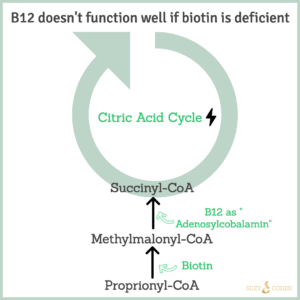What's On This Page?
ToggleDid you know that biotin impacts your thyroid levels? It’s not as clear-cut as you might think, especially if you have thyroid disease. Let me share more details today.
There was a medical conference held in San Diego California recently and a physician presented a case study about a woman who took a large amount of B vitamin called biotin. I’m sure you’ve heard of it, it’s the B vitamin that everyone takes to try to get thick hair and strong nails. Anyway, the 55-year-old woman’s level of thyroid hormone spiked so high she experienced thyrotoxicosis (extremely high thyroid levels), yet she had no history of Graves’ disease, Hashimoto’s thyroiditis or thyroid disease of any sort.

The problem arose from the woman taking a high dose of biotin which she was using for multiple sclerosis (MS). They could not fully explain why the spike in thyroid levels had occurred, they think it might have something to do with assay interference, but regardless this case study poses an excellent warning to practitioners about the phenomenon.
It’s not the first time biotin has come into the spotlight, there was a December 2012 article published in the scientific journal, Pathology which suggested a connection. I may be able to explain why she suffered from this problem as I have my own theories.
But before I do so, let me first remind you about the benefits of biotin.
I’m dismayed by headlines with “Beware of Biotin” and others along this continuum. It’s alarming and provokes unnecessary fear.

Biotin is an incredible and life-sustaining nutrient, not one to be feared unless you overdose of course! Biotin is one of the B vitamins found in B Complex. Biotin used to be called vitamin H and the “H” was for the German word haut, which translates to skin. Biotin is a skin-loving nutrient, well-known in the beauty industry. It’s also helpful for heart conditions, blood sugar, and wound healing.
Biotin is made in your body by your intestinal (gut) flora, aka your ‘probiotics’ which manufacture it for you. It’s probably stored in the mitochondria (mito) which are in your cells. Biotin is found naturally in meats, fish, beans, egg yolks, and nuts.
If you’re deficient, you might look older than you should, your cuts don’t heal as fast, your heart rhythm might be irregular, your hair might be falling out and you’re probably exhausted. I wonder if any of these symptoms are what led the 55-year-old woman to take high doses of biotin as a supplement. By the way, vitamin B12 requires biotin – they work better together.
#1 How Biotin Impacts Thyroid Levels
I have to preface this with the fact that biotin is a relatively safe nutrient, it’s hard to get too much. But it is possible! She had blood work done when she went to the hospital and her TSH was 0.032 uIU/ml, and her Free T4 was 7.8 ng/dl. Taken together this is suggestive of high thyroid hormone levels in the blood. Symptoms of high thyroid (hyperthyroidism which means higher-than-normal thyroid levels) are speedy in nature, meaning everything is faster in the body, so you might expect that she had developed anxiety or other mood changes, irritability, insomnia, fast heart rate (tachycardia), diarrhea, sweating and weight loss.
These are typical of hyperthyroidism, however, the patient did not have the symptoms even though she had high thyroid levels. For this reason, she was diagnosed with pseudohyperthyroidism.

You might be wondering if she took other medications and the answer is yes, she took a popular antidepressant called escitalopram, as well as an antispasmodic called baclofen. She also took LDN (Low Dose Naltrexone) 4.5mg for multiple sclerosis (MS). Her doctors stopped the high-dose biotin supplements for three days and retested her thyroid levels and they got closer to normal. Could this be a coincidence?
The doctors wondered that as well, so they re-challenged her with high-dose biotin and sure enough, the TSH and Free T4 levels altered themselves accordingly and normalized again after stopping biotin. You might wonder what drove her to take so much of this B vitamin, and it’s pretty interesting.
#2 How Biotin Impacts Neuropathy
Biotin is essential in terms of fatty acid synthesis and helps make healthy myelin as well as energy. This means biotin is used to help with the covering around nerves which is crucial for people who have multiple sclerosis. After all, that’s the autoimmune condition that leads to demyelination of the nerves and painful neuropathy. So she was doing a good thing.
Several randomized, double-blind, placebo-controlled studies demonstrate sustained improvement in disability among MS patients. People with MS are using more and more biotin for myelin support as well as energy production, so it’s not just about beautiful skin and hair. Patients with MS suffer with profound chronic fatigue and as an aside, I should tell you that a recent article suggests caffeine consumption improves fatigue in patients with relapsing and remitting MS.
The study was based upon 126 patients, but still it is something you should know if you have this condition. If you are interested in more information about neuropathy, you will definitely want to read, Small Fiber Neuropathy, Causes and Treatment.
#3 How Biotin Impacts Digestion – It’s Indirect but It Happens
I mentioned earlier that I could explain why this happened. It’s pretty simple if you know enough about thyroid hormone production. You see, approximately 20 to 25 percent of your thyroid hormone is made in your intestines, so if you have gut dysfunction, your ability to produce thyroid hormone is no doubt compromised. I suspect that the high dose biotin increased her thyroid hormone production (by supporting gut health) and contributed to the spike in the form of T4 thyroid hormone which does not work in the body until it converts to T3. If there isn’t enough T3 to go around, there could be a higher risk of gastroparesis, or constipation.
Biotin would not increase utilization of thyroid hormone, or cellular entry. I’m saying that biotin would only crank up levels of T4 thyroxine thyroid levels (a relatively inactive hormone), it would not increase levels of T3 (the active form), nor would it it drive the thyroid hormone into the cell, which explains why she had high levels in her blood, but did not have associated hyperthyroid symptoms. The T4 was not converting to T3, nor was it getting into the cell. If this doesn’t make sense, please read my best-selling book, Thyroid Healthy.
Testing Thyroid Levels
One more reason biotin causes apparent ‘hyperthyroidism’ activity may be partly attributed to its interference with thyroid hormone tests, but no one is sure how. The point is that we know biotin can spike levels, but we don’t know yet what is a safe dose for everyone. MS doctors should be informed that this can happen so they can distinguish between this phenomenon versus a true endocrine thyroid disorder. Patients should be aware as well. After all, you want to be diagnosed properly and not pinned with a disorder you don’t really have especially when your thyroid levels will probably return to normal after the phenomenon has been discovered.
You also don’t want your medication dose altered unnecessarily. They would lower it if they saw labs similar to this woman’s and that could be a mistake and leave you feeling even worse. I really want to emphasize that biotin is an impressive supplement. It’s nothing to be fearful of, in fact, we make it in our body every day. We can certainly enjoy supplements of it, but like any good thing keep the dose reasonable. Too much of any good thing is bad, with the exception of chocolate!
Again, we should not be afraid of biotin, as it is critical to human health. In fact, there was a recent article about a 10 year old girl with autism, who also had poor hair and nail growth and she was given biotin (along with a drug called acetazolamide) and it was pretty remarkable. The researchers of the article published in Pediatric Neurology (Feb 2018) stated that “Administration of biotin restored her nail and hair growth and improved intellectual ability and school performance.”
In closing, I’d recommend that if you take a biotin supplement in high doses (2 to 10mg), stop it 3 to 5 days before you go in for your test. The reason is you don’t want the biotin supplement to throw off your test results and make it look like you have thyroid levels (when you are clinically hypothyroid or normal). Just so you understand “hypothyroid” means that the thyroid levels are lower-than-normal, whereas hyperthyroid means the thyroid levels are higher-than-normal.
In other words, high-dose biotin can spike T4 and reduce TSH which make it look like your thyroid levels are higher than normal, but it’s a FALSE “pseudohyperthyroid” state and your doctor will want to treat it as an artifact instead of a disease.

Suzy Cohen, has been a licensed pharmacist for over 30 years and believes the best approach to chronic illness is a combination of natural medicine and conventional. She founded her own dietary supplement company specializing in custom-formulas, some of which have patents. With a special focus on functional medicine, thyroid health and drug nutrient depletion, Suzy is the author of several related books including Thyroid Healthy, Drug Muggers, Diabetes Without Drugs, and a nationally syndicated column.



